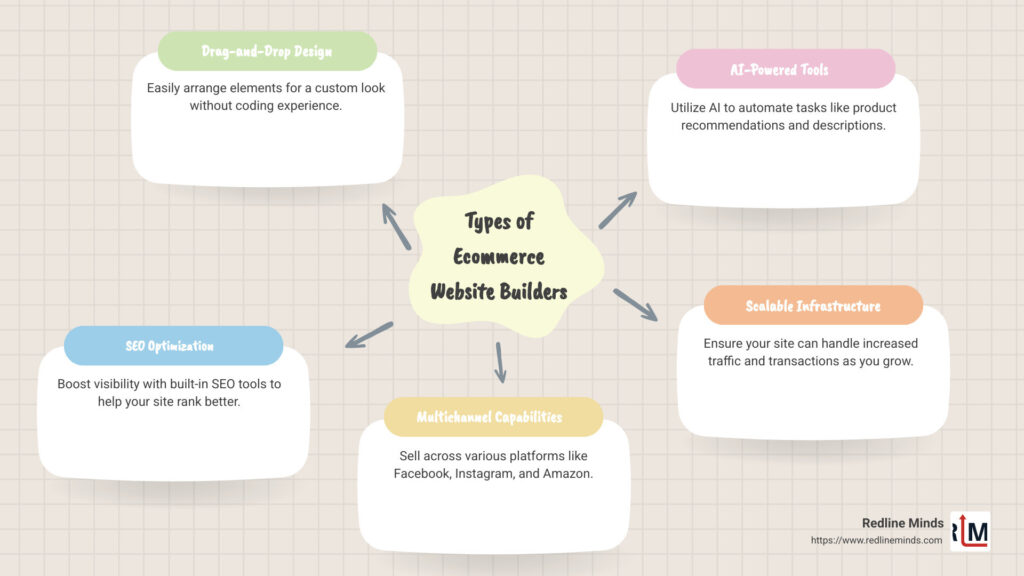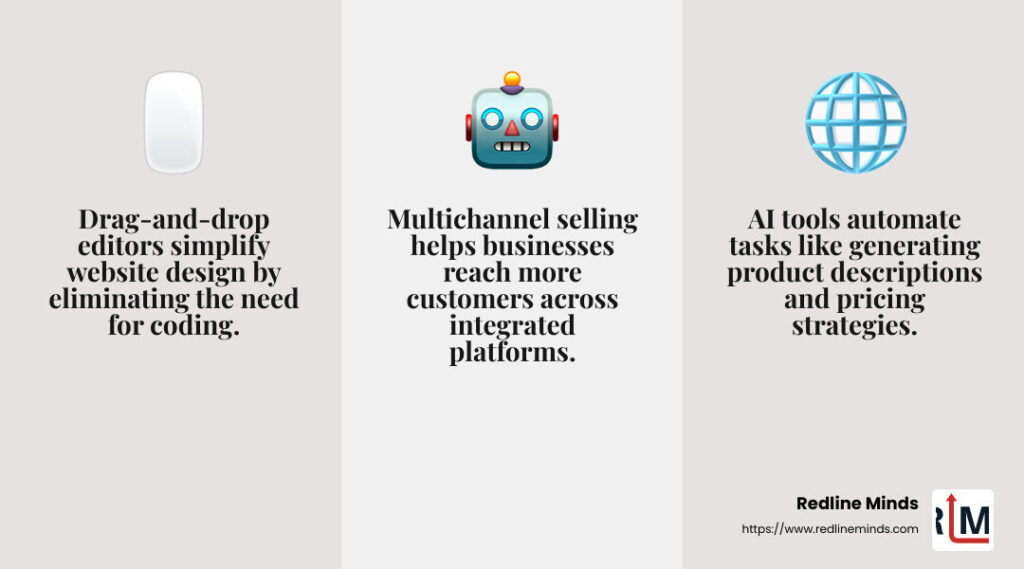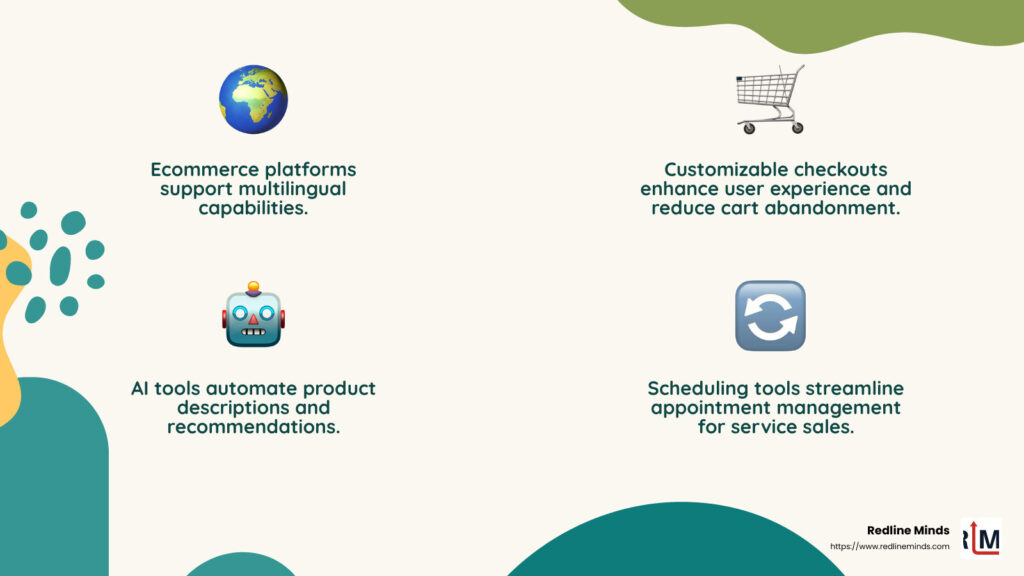Constructing Commerce: The Ultimate Website Builder Roundup

Ecommerce website builder tools have become essential for businesses aiming to sell online, driving remarkable growth in the ecommerce sector. Whether you’re looking to sell physical products, digital goods, or subscriptions, these builders offer the flexibility to meet your needs. For midsize online retailers seeking to boost sales and streamline operations, choosing the right platform is crucial. Many platforms are known for their robust ecommerce features, seamless multichannel selling, and scalability.
The world of ecommerce has seen exponential growth, especially following key technological advancements. Online shopping has evolved from a novelty into a necessity, driven by convenience and accessibility. This shift has prompted many businesses to focus intensively on enhancing their online presence. As the digital age marches on, the ability to effectively leverage an ecommerce website builder could be the key to reaching new heights in sales and customer engagement.
I’m Lori Appleman, with nearly 25 years in the ecommerce space. I’ve helped businesses thrive online by choosing the right tools and strategies. In this piece, we’ll dive deep into ecommerce website builders, setting you up for success.

Understanding Ecommerce Website Builders
Ecommerce website builders are the backbone of online selling, offering tools that make it easy for businesses to create and manage their digital storefronts. These platforms are designed to simplify complex tasks, allowing even those without technical expertise to launch a professional-looking store. Let’s explore three key features that make these builders indispensable: drag-and-drop functionality, AI tools, and multichannel selling.
Drag-and-Drop Simplicity
One of the standout features of modern ecommerce website builders is the drag-and-drop editor. This tool allows users to design their website by simply dragging elements like text boxes, images, and buttons into place. This intuitive approach makes it easy for anyone to build a site without needing to write a single line of code. As a result, business owners can focus on creating a visually appealing and user-friendly site that reflects their brand.
For instance, many platforms offer a wide range of customizable templates that users can adapt to their needs, ensuring a unique online presence that aligns with their brand identity. This feature is especially beneficial for small business owners who may not have the budget to hire a professional designer.
AI Tools: The Future of Ecommerce
AI tools are changing how businesses operate online. They automate routine tasks, freeing up time for business owners to focus on growth strategies. For example, AI can generate product descriptions, suggest pricing strategies, and even provide personalized recommendations to customers.
Some ecommerce builders incorporate AI-powered features that help create ecommerce sites efficiently by using AI to generate content and design elements custom to the business’s specific needs. This not only speeds up the setup process but also ensures that the content is relevant and engaging for the target audience.

Multichannel Selling: Expanding Your Reach
In today’s competitive market, selling across multiple channels is crucial. Ecommerce website builders support multichannel selling, allowing businesses to reach customers wherever they are—be it on their own website, social media platforms, or marketplaces.
This seamless integration ensures that inventory, orders, and customer data are synchronized across all platforms, providing a cohesive shopping experience. Many builders allow users to manage their in-store and online sales from a single dashboard, simplifying the process of expanding into new markets.
In summary, ecommerce website builders empower businesses with tools that simplify the creation and management of online stores. By leveraging drag-and-drop editors, AI tools, and multichannel selling capabilities, businesses can improve their online presence and maximize their reach. These features will continue to play a pivotal role in the success of ecommerce ventures.
Top 5 Features of Ecommerce Website Builders in 2025
Multichannel Selling: Expanding Your Reach
In 2025, multichannel selling is more important than ever. Ecommerce website builders have evolved to support sales across various platforms—your own website, social media, and popular marketplaces. This integration is crucial for reaching a broader audience and increasing sales.
With integrated platforms, businesses can manage everything from one place. This means inventory, orders, and customer data are seamlessly synced, reducing the risk of errors and saving time. This makes it easier to expand into new markets without the hassle of juggling multiple systems.
Customizable Checkout: Enhancing User Experience
A smooth checkout process is vital for converting visitors into customers. Modern ecommerce website builders offer customizable checkout options that improve the user experience by allowing businesses to tailor the checkout process to their needs. This includes personalized payment options and secure transaction methods.
By providing a streamlined and secure checkout, businesses can reduce cart abandonment rates and build trust with their customers. The ability to customize checkout pages ensures that the payment process aligns with the brand’s identity, offering a cohesive customer journey from start to finish.
International SEO: Reaching a Global Audience
International SEO is a game-changer for businesses looking to expand globally. Ecommerce website builders now come equipped with tools that support multilingual capabilities and global optimization strategies. This ensures that your site can reach and engage with audiences worldwide.
Multilingual support allows businesses to cater to customers in their native language, enhancing the shopping experience and increasing conversion rates. Combined with global optimization features, businesses can effectively target international markets and drive traffic from diverse regions.
Scheduling Tools: Streamlining Service Sales
For businesses that offer services, scheduling tools are essential. Ecommerce website builders now include features that facilitate appointment management, providing convenience for both businesses and customers.
These tools allow customers to book appointments directly through the website, streamlining the process and reducing the administrative burden on the business. With automated reminders and easy rescheduling options, scheduling tools improve customer convenience and improve service delivery.
AI-Powered Tools: Boosting Efficiency
AI-powered tools are revolutionizing ecommerce by automating routine tasks and providing smart recommendations. These tools can generate automated product descriptions, suggest pricing strategies, and offer personalized recommendations to customers.
By leveraging AI, businesses can save time and resources while delivering a more personalized shopping experience. AI tools help in understanding customer behavior and preferences, allowing businesses to tailor their offerings and marketing strategies effectively.

In conclusion, the top features of ecommerce website builders in 2025 are designed to improve efficiency, expand market reach, and improve customer experience. By integrating multichannel selling, customizable checkouts, international SEO, scheduling tools, and AI-powered solutions, businesses can stay competitive in the changing ecommerce landscape.
Key Features to Look for in an Ecommerce Website Builder
When choosing an ecommerce website builder, there are several key features to consider that can significantly impact your business’s success. Let’s explore the essentials: SEO support, payment options, and scalability.
SEO Support: Boosting Visibility
Search Engine Optimization (SEO) is crucial for driving traffic to your online store. A good ecommerce website builder offers robust SEO tools to help your site rank higher in search engine results. Look for features like customizable meta tags, clean URL structures, and built-in blogging capabilities. These elements improve your site’s visibility and attract more potential customers.
Moreover, some builders provide advanced SEO features like AI-generated heatmaps and international SEO support. These tools help you understand customer behavior and optimize your content for global audiences, ensuring your products reach a wider market.
Payment Options: Facilitating Transactions
Offering diverse payment options is vital for accommodating customer preferences and increasing sales. A reliable ecommerce website builder should support multiple payment gateways, such as credit cards, PayPal, Apple Pay, and Google Pay.
For instance, a platform that integrates various payment methods and provides an end-to-end encrypted transaction process ensures security and convenience for both you and your customers. By offering flexible payment solutions, you can reduce cart abandonment rates and improve the overall shopping experience.
Scalability: Preparing for Growth
As your business grows, your ecommerce platform should be able to scale with you. Scalability is about having the capacity to handle increased traffic, inventory, and sales without compromising performance.
Look for ecommerce website builders that offer scalable plans and features like unlimited product listings and seamless inventory management. Platforms that provide different pricing tiers and a wide array of apps can support businesses of all sizes. This flexibility allows you to start small and expand your online store as your business evolves.
In summary, when selecting an ecommerce website builder, prioritize SEO support, diverse payment options, and scalability. These features will equip your business to attract more customers, facilitate secure transactions, and grow sustainably.
Frequently Asked Questions about Ecommerce Website Builders
What is the best ecommerce website builder for beginners?
For those just starting, a beginner-friendly ecommerce website builder is key. Look for platforms that offer a drag-and-drop editor, which makes designing your store as simple as pie. A no-code solution that lets you build your ecommerce site without needing any design or coding skills is ideal. Such platforms often provide templates and an easy-to-use editor to help beginners get started quickly.
When choosing a builder, also consider the availability of customer support. Having access to tutorials, a help center, or even a chatbot can make a world of difference when you’re new to ecommerce.
How do I choose the right ecommerce website builder for my business?
Choosing the right builder depends on your business needs. Start by identifying what you want to sell—physical products, digital goods, or services. Some platforms are great for physical products due to their robust sales features, while others excel in selling services.
Next, compare features. Do you need multichannel selling, or is a simple online store enough? Consider the scalability of the platform too. Some builders offer various pricing plans, allowing you to expand as your business grows.
Finally, evaluate the ease of use and whether the platform supports the payment options your customers prefer. A detailed features comparison will help you weigh the pros and cons of different builders, ensuring you pick one that aligns with your business goals.
Can I sell internationally with an ecommerce website builder?
Yes, you can sell internationally with the right ecommerce website builder. Look for platforms that offer international SEO support and multilingual capabilities. This ensures your store can reach a global audience by optimizing for different languages and regions.
Some builders support multiple languages, though you might need to manually translate additional content. Also, check if the builder provides tools for handling international shipping and taxes. This can simplify the process of expanding your market beyond domestic borders.
In summary, whether you’re a beginner or looking to go global, the right ecommerce website builder can be a game-changer. Consider ease of use, feature sets, and international capabilities to find the best fit for your business.
Conclusion
At Redline Minds, we understand that navigating ecommerce can be daunting. That’s why we’re here to guide you through every step of the way. Our expertise in ecommerce consulting, web development, and online marketing is custom to help you build and grow your online presence effectively.
Strategy Development is at the heart of what we do. We help retailers not only establish but also improve their online sales channels. Our team dives deep into your business needs to craft a strategy that aligns with your goals. Whether it’s choosing the right ecommerce website builder or optimizing your site for SEO, we’ve got you covered.
We focus on creating a seamless user experience with top-notch UX/UI design. This ensures your customers enjoy a smooth shopping experience, keeping them coming back for more. Moreover, our SEO services are designed to boost your visibility, making it easier for potential customers to find you.
For businesses looking to expand their reach, we offer solutions that support multichannel selling and international expansion. With our guidance, you can confidently take your products to new markets and tap into a global audience.
Ready to lift your ecommerce game? Explore our ecommerce website design services and see how we can help you achieve your business goals. Let’s construct your commerce future together!